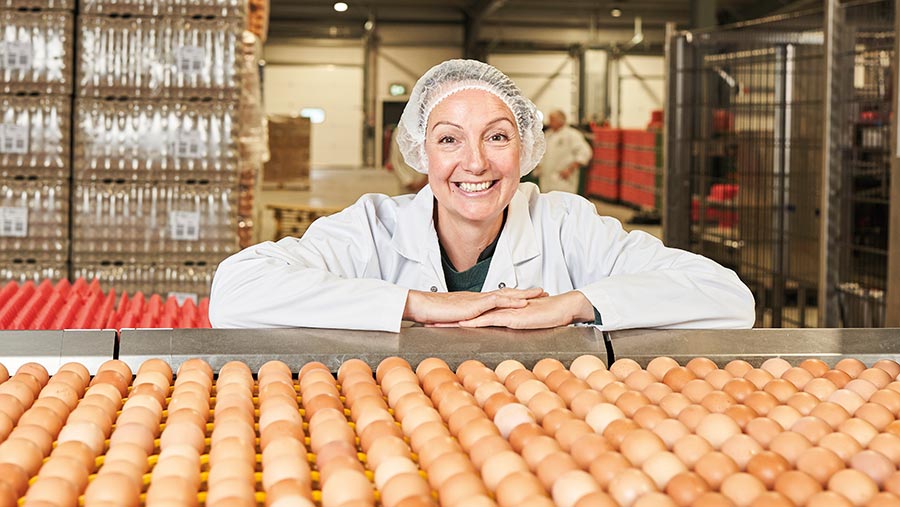Move into duck eggs aids growth at St Ewe farm
 © Oli Lees
© Oli Lees Many criteria are taken into consideration when deciding who should win each Farmers Weekly Awards category, though for St Ewe Free Range Eggs – last year’s Poultry Farmer of the Year – impressive marketing was one of the standout attributes.
It is therefore of little surprise to find that the Cornwall-based producer/packer has continued to expand its offering – with new branded products, new national contracts, and even a new line of poultry.
See also: Who were last year’s Poultry Farmer of the Year finalists?
The move into duck egg production with the Dabbling Duck range, which now adorns the shelves of numerous M&S stores, has been something chief executive Rebecca Tonks has been planning for several years.
“I had always wanted to widen our offering, and have had duck eggs waiting in the wings for three or four years,” says Rebecca.
“Our typical clientele is interested in showcasing beautiful produce, and duck eggs tick that box. It was a natural progression.
“We secured a contract with M&S in December last year, with the intention of starting to supply duck eggs this April, but two weeks later they phoned us saying they really wanted the eggs now – could we do it?
“We had our old packing centre at our family farm lying dormant, and knew we could use that, so we put out feelers and found a duck farmer who could supply eggs of the quality and quantity required.
“It was obvious this could only be done if it was at the right price for the farmer, but M&S said ‘yes’, so off we went.”
It still took another month to sort the packaging, though the designs were already well advanced before the contract was signed, and the first Dabbling Duck eggs appeared on M&S shelves in late January.
Business facts
- New £4.8m packing centre at Grampound Road with capacity for 200,000 eggs a day
- Home farm at Tregony, with own flock of Aracuna hens arriving in July
- Duck egg packing and egg pasteurisation unit on home farm
- 24 other contracted farmers (including one duck egg producer)
- Egg production mainly in the South West, but also in Wales and Northern Ireland
- Eggs sold to supermarkets, delis and restaurants, as far afield as London and Hong Kong
- Total staff of 56 (up from 32 a year ago)
- Own fleet of branded lorries
Such has been the success of the new venture already that Rebecca is now planning on establishing her own flock of ducks at her family’s Ventonwyn Farm at Tregony and is in the process of redesigning the hen houses to accommodate the new species, arriving in 2025.
Key to product launch success
So what is key to a successful new product launch in the competitive egg market?
The first move, says Rebecca, is to log the brand name as intellectual property, which involves a small fee, but means no one else can take it.
Packaging design is also crucial, and this is done in-house, involving the whole St Ewe team. “It needs to be distinctive,” says Rebecca. “I believe opening a box of eggs should be the same as opening a box of chocolates.”
Consumer research is an ideal, though for Rebecca it is more about gut feeling and having an understanding of what different customers are looking for.
“Different supermarkets cater for different demographics,” she says. “For example, while Tesco has a pretty wide spectrum of customers, Morrisons seems to be for the slightly older age group, while M&S and Waitrose are clearly more high-end.”
St Ewe aims to provide a different product to satisfy each demographic, “according to the ‘vibe’ we get, and based on retailer feedback”.
“We don’t always get it right,” Rebecca concedes. “For example, our Super Eggs – which were launched as a high-health product during the Covid pandemic – need a rebrand to really come in line with what consumers are looking for.
“I feel the packaging and messaging just needs a bit of a rethink. It’s a great product nutritionally, but we can communicate this a lot more effectively.”
Opulent Collection range
Greater success has been achieved with another new product launch – the Opulent Collection Rich Yolk range – which is now sold into delicatessens through a high-end London wholesaler.
“We were already selling a similar product to supermarkets as an everyday item, but were told that the delis wanted something a bit different, so we have developed the Opulent range, to meet that specific demand.
Timing is also important, says Rebecca, recalling that the launch of Dabbling Duck eggs coincided with some high-profile times for the monarchy, with the late Queen’s platinum jubilee last year, followed by the coronation of King Charles III earlier this month.
“The colour we chose for our Dabbling Duck range is purple, which is certainly a blue-blood sort of colour, and there is no doubt that the duck egg is the king of eggs. This all appeals to some consumers.”
Key areas for successful marketing
- Knowledge of consumer trends
- Good package design
- Trust to gut feeling
- Timing
Tough times for egg producers
The past 12 months have clearly been tough for egg producers and packers, with steeply rising costs, retail price pressures, and avian influenza combining to create a national shortage of eggs.
St Ewe has not been immune to any of this, though Rebecca sees it as a necessary process to make retail buyers and consumers understand the economic reality of primary food production and, more specifically, what it means to be an egg producer.
“As a packer, our job is to sell eggs to consumers, but our priority is to look after our farmers,” she says. “They put a huge amount of time in – especially with avian influenza about – and also take the risks.
“As soon as the war in Ukraine kicked off and feed costs started to climb, we told our retail customers we were putting up our prices – we could not hang around for 12 weeks.”
The egg shortage has put the spotlight back on the farmer, says Rebecca, which has given them a louder voice in the supply chain.
St Ewe has tried to play its part, aiming to improve communication and help overcome the “woeful disconnect” between consumers and where their food actually comes from.
Despite the difficult times, St Ewe has been able to increase the number of contracted producers from 17 a year ago to 24 now, including a recent move into Northern Ireland.
“None of our farmers have gone out of business, and we do our best to help them with cost management, ensuring cashflow and setting forecasts. It’s a partnership approach that works.”
Rebecca is especially proud that the business now has a national listing with both Tesco and Sainsbury’s, as well as a new relationship with Marks & Spencer, supplying their speciality and own-brand range of eggs – “not bad for a business which started out as a small regional egg producer”.
Guinness world record
St Ewe also impressed the judges last year with its charitable work, including offering discounts to local communities during Covid lockdowns and donating more than 400,000 eggs to local food banks.
This community involvement is set to continue with the company endeavouring to set a new Guinness world record… for the world’s longest egg and spoon race.
It will take place this summer along the entire 300-mile Cornish coastline, aiming to raise £1m for Hospitality Action and Cornwall Air Ambulance.
The two charities have been chosen in response to their work throughout the challenging times of Brexit and Covid, and during the cost-of-living crisis.
“Cornwall has been particularly affected by these events,” says chief executive Rebecca Tonks.
“Behind the ‘buckets and spades’ image are the untold stories of hardship and struggle that the farming, food and hospitality industries have had to face to stay afloat.
“We will use the record attempt to not only bring together the local community, but to allow the hospitality, food and farming industries to have their voice heard, as well as raising much-needed funds for these two pivotal charities.”
The Great Cornish Egg and Spoon Race will take place between 3 and 7 July with two teams racing to the Land’s End finish line.
Further details and a chance to get involved or donate can be found on the eggandspoonrace.com website.

